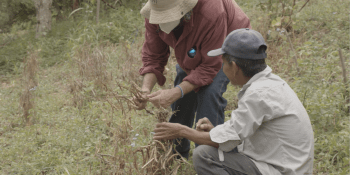Opportunity to improve livelihoods for smallholders in Guatemala

There are many ways to improve agriculture practices and systems. One promising and cost-effective way is to learn from others and think about how to implement the same structure in your own context.
This was something Raul Salguero, Coordinator of the Climate Change Unit at the Ministry of Agriculture, Food and Livestock in Guatemala thought about when he joined an intensive workshop on the smallholder-focused mitigation project Standard Assessment of Mitigation Potential and Livelihoods in Smallholder Systems (SAMPLES).
It aims to gather the much needed data on mitigation potentials and greenhouse gas emissions in smallholder contexts. The goal is to develop a low-cost protocol to quantify greenhouse gas emissions and to identify mitigation options for smallholder that in the end could improve their livelihoods and lives.
What’s innovative with the SAMPLES-approach? Learn more: Advancing methods for greenhouse gas quantification
The most recent SAMPLES-project meeting was held in June 2013, in Kisumu, Kenya. Thanks to a good relationship with the International Center of Tropical Agriculture (CIAT), Raul Salguero got a chance to participate in the meeting. He described the experience like this:
The International Livestock Research Institute (ILRI) started off the meeting by giving an overview presentation on the work that the program does. ILRI showed how their researchers are implementing measurements of greenhouse gases in Kenya and in other regions of Africa. The projects aim to mitigate climate change while improving the productive capacity of farmers.
On the next day we got the opportunity to join a fieldtrip. During the trip we were shown how greenhouse gas emissions are measured in different areas: in corn fields, in forests and on livestock farms. It was very interesting to observe the advanced scientific equipment used for this purpose.
On the final day several Ph.D. students and development practitioners working with mitigation issues from outside Kenya gave presentations on their respective work.
What this project is doing is remarkable, and will allow for universities and institutions to both understand and apply the processes and methodologies that this project is creating.
Raul emphasized how much Guatemala could actually learn from the SAMPLES-approach:
In Guatemala, scientists are using theoretical methods to make these calculations instead of, like in SAMPLES; measuring the gases directly from the soil!”
I believe that a project like SAMPLES is completely feasible to be implemented in Guatemala. It is a great opportunity to allow for us to improve agricultural practices for smallholder farmers as well as greenhouse gas calculations.
At the moment, we have a strongly supported program named ‘Programa de agricultura familiar para el fortalecimiento de la economía campesina – PAFFEC’ (Household Agriculture Program for the Strengthening of Small Farmers Economy). SAMPLES could very well fit into these initiatives.

THE SAMPLES FIELDTRIP IN KISUMU, KENYA. PHOTO: K. FOSTER (ICRAF). MORE PHOTOS FROM THE TRIP.
SAMPLES-researchers are currently testing methods and collecting data in the Philippines, Kenya and Vietnam. The field sites cover a range of smallholder systems, including intensive rice, rice-wheat rotations, and mixed systems of maize, sugarcane, livestock, and vegetables.
Learn more: reducing greenhouse gases and need for water with new farming system
The current core SAMPLES consortium consists of World Agroforestry Centre (ICRAF) International Livestock Research Institute (ILRI) , International Rice Research Institute (IRRI), Mitigation of Climate Change in Agriculture Program by Food and Agriculture Organization of the United Nations (FAO), the Karlsruhe Institute of Technology and CGIAR Research Program on Climate Change, Agriculture and Food Security (CCAFS).
SAMPLES is actively engaging research networks across sub-Saharan Africa and South and Southeast Asia to expand the geographic scope of it sites and institutional representation.
Learn more about SAMPLES: From field to landscape: Tackling mitigation and livelihoods with help from farmers
José Luis Urrea works as Communications Officer at the CGIAR Research Program on Climate Change, Agriculture and Food Security (CCAFS) Latin America office.



